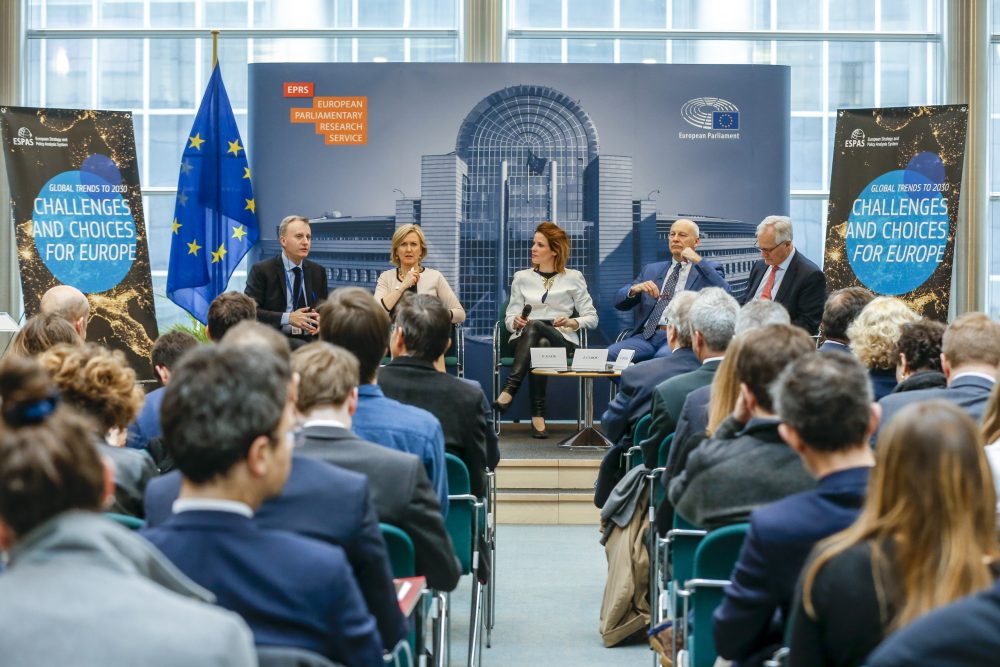Written by Eamonn Noonan, with Atte Ojanen,

April 2019 marked the launch of the new European Strategy and Policy Analysis System (ESPAS) report: ‘Global Trends to 2030: Challenges and Choices for Europe’. The report is a result of a multi-year joint effort by key European institutions. The collaborative nature of the ESPAS process was also reflected in the launch event, which featured variety of stakeholders as speakers.
Lead author of the report, Florence Gaub, from EUISS, highlighted the report’s structure, focusing on ‘mega-trends’, ‘catalysts’ and ‘game-changers’. ‘Mega-trends’ refer to decade-long trends, which are extremely hard to alter, such as climate change and increasing connectivity. ‘Catalysts’ on the other hand are short-term trends that are more easily influenced. These include trends like technological progress, increasing trade and migration. Finally, informed by mega-trends and catalysts, ‘game-changers’ are the key decisions that will shape our common future. The most pressing game-changers include responses to climate change and the populist threat to democracies.
ESPAS Chair, Ann Mettler, from EPSC, depicted the report as a call to action. Despite the somber challenges, we are still in a position to take action and shape the future for the better. Importantly, the ESPAS process has fostered the role of foresight and preparedness throughout European decision-making. Trends such as the decline of democracy, a global power shift towards China, and growth in connectivity, are now more widely acknowledged. The report helps frame the discussion concerning global challenges, which is crucial given the next institutional cycle. Not only can we shape our own future, but the European Union is also a normative superpower, standing for human rights, democracy and equality in an increasingly uncertain world.
The report lays the groundwork for a serious debate about the future, as expressed by Jim Cloos, Deputy Director-General for General and Institutional Policy at the General Secretariat of the EU Council of Ministers. It forces us to discuss Europe itself and its role in the world, rather than being trapped in a discourse on internal politics. Foresight is not a matter of predicting the future, but rather about framing issues, building a shared narrative and understanding. One cannot tackle the most challenging issues of the future without first agreeing what the problems themselves are. It is central therefore that the ESPAS report is not only circulated within the foresight community, but also finds its way into the hands of heads of states.
In spite of the grave challenges, one can also find a positive and motivating tone in the report. As Christian Leffler of EEAS noted, the EU is well positioned to respond to these challenges and provide stability for the world. Many of the problems are recognised in the institutions and policies of the Union, especially when compared to other global actors. While preparation and adaptation are still needed, the structural framework for effective response is in place. This is important given the contested and fragmented global context. The rules-based international order and multilateralism are giving way to competitive multi-plurality. The response lies in the EU’s strategic autonomy, ensuring the Union’s capacity to choose its own path.
The launch event also generated lively discussion. The severity of climate change, ‘de-growth’, the potential of Africa, the future of trade, and gender-balance figured in the questions from the audience. The questions highlighted the essence of foresight – reconciliation and balancing conflicting views. Ultimately, foresight is not a mere intellectual exercise, as these challenges are already affecting us profoundly. The launch day of this second ESPAS report marked the beginning of a new discussion, which aims to strengthen the culture of preparedness and anticipation throughout Europe.








[…] Source Article from https://epthinktank.eu/2019/04/25/launch-of-the-new-espas-foresight-report/ […]